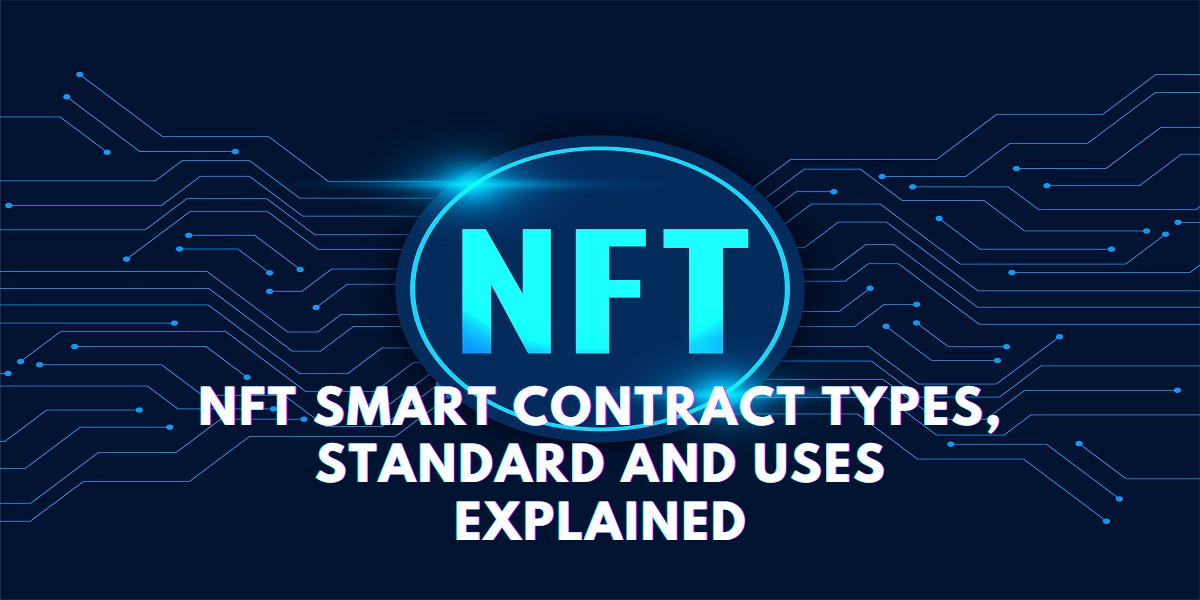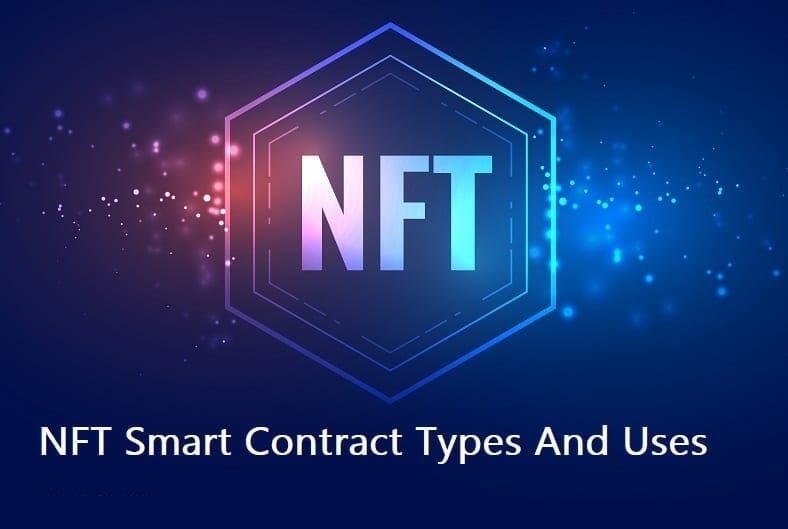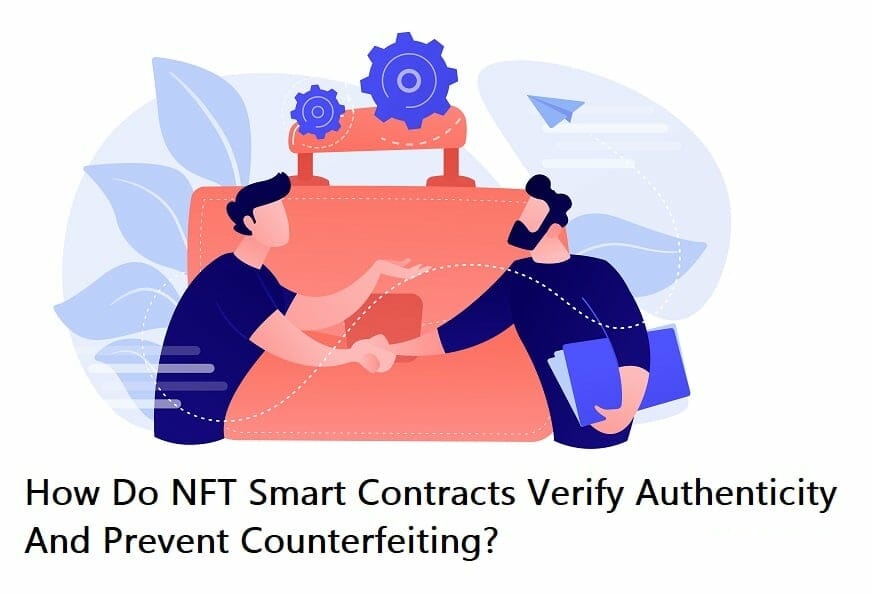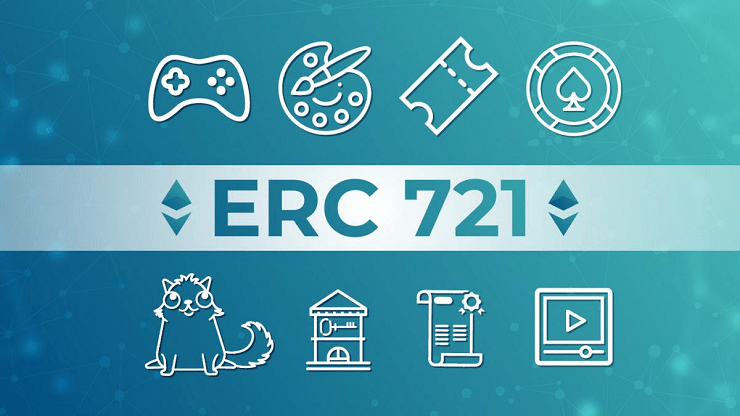NFT Smart Contract Types, Standard And Uses Explained

Are you new to the NFT market and wondering, “what is an NFT Smart Contract?” Then you are not alone! Many newcomers are curious to know how to secure their NFT tokens as intellectual properties against fraudulent activities. And here is where understanding NFT Smart Contracts can help you out.
As a blockchain program, a Smart Contract serves as safe storage for digital information for all NFT transactions between a buyer and an investor. So it is crucial to know what it is before you learn how to create an NFT Smart contract for your transactions on the Ethereum blockchain.
So today, we shall check out what is an NFT smart contract, some easy NFT Smart contract examples, its different types, and its function in verifying token authenticity.
What Is An NFT Smart Contract?

For everyone investing in popular and upcoming NFTs projects, knowing about NFT Smart Contracts is a must. It stores all information regarding the transaction of an NFT from buyer to seller and is accessible by permissible parties. It is the ultimate verification of NFT ownership and is also transparent.
As NFTs are digital intellectual properties, these tokens deserve the utmost security that is possible through a Smart Contract. The NFT Smart contract code can store the transaction details and stays within the blockchain. This stored information has all the transferability information that reflects a legitimate transaction between two parties.
Not to forget, NFT Smart Contracts can take care of royalties and link to different digital assets. It also ensures that one NFT cannot be divided and sold as individual components. They are the ultimate permanent identification information, making your NFTs non-replicable and unique.
What Are The Different Standards Of NFT Smart Contracts?
Now that you understand what an NFT smart contract is, let us move on to the two different standards of NFT Smart Contracts. They are both Ethereum standards and are widely popular for their secure transactionality.
ERC 721 Standard
The NFT Smart contract Ethereum in ERC 721 Standard is the very definition of the software. It is found on the Ethereum blockchain and makes NFTs one-of-a-kind and everlasting on the blockchain as an investment. All in all, it is what makes NFTs non-fungible, harder to replicate, and a popular unique digital asset on the Ethereum blockchain.
A proper NFT contract example would be how concert tickets work. They all look the same, but each has an ID, a unique barcode, and a serial number that makes it unique and non-fungible, making them harder to replicate.
One ERC 721 can manage multiple NFT tokens and just need the Token ID and Smart Contract address. It represents the authenticity of your digital ownership and keeps the NFT token safe from counterfeiting.
It is one of the most popular NFT Smart Contracts due to its ability to make your NFT the most distinctive and secure from fraudulent practices.
ERC 1155 Standard
The NFT Smart contract solidity is further strengthened through the ERC 1155 Standard, a multi-token capable of multi-transactions. It can multi-manage various tokens. With ERC 1155 Standard, a token ID can depict its type, its supply, and metadata.
It can help contracts be non-fungible, semi-fungible, as well as fungible tokens. Therefore, with one ERC 1155 Standard, you can transfer multiple token types in a single transaction. Doing so not saves on transactional costs but also does not individually need to approve any token contracts as ERC 1155.
The aim of ERC 1155 is to expand the token ecosystem and help NFTs be more accessible and secure.
How Do NFT Smart Contracts Verify Authenticity And Prevent Counterfeiting?

The NFT Smart Contract Ethereum platforms have step-by-step processes to ensure transactional authenticity. These steps include tracing the token’s creation, development, and launch on a public blockchain for minting. Hence, the stored metadata in these NFT Smart Contract codes can help track the wallet address and its activities from the blockchain.
Therefore, NFT Smart Contract makes it easy to identify an NFT’s creator, track the purchase, and verify the entire trade-off’s legitimacy. Since they are transparent, the public can review the transfer of ownership and the transaction history on the Ethereum blockchain.
Keeping this information public and accessible curbs counterfeiting as it becomes easier to authenticate a legitimate transfer of NFT token ownership. Even if someone decides to duplicate it from the public blockchain, the blockchain can prove the authentic ownership thanks to the owner showing off their NFT token. This nullifies the duplicate’s worth and makes it of no value.
All in all, NFT Smart contract solidity secures NFT transactions and token originality registers it as a unique digital asset on the public blockchain.
Also read: How To Enter The Metaverse With Sandbox ? Know Everything !
What Are The Different Uses Of NFT Smart Contracts?
There are various uses of an NFT Smart contract, for example:
- An NFT Smart Contract removes the middle-men aspect of NFT transactions. Doing so reduces the risks of scamming and also helps save up the extra costs (commissions) of the transaction.
- Due to 0 middlemen issues, the transactions take little to no time, helping the owner enjoy their tokens without any hassle.
- Since there are lesser documents involved, it is more quick and efficient.
- If there are any business or commercial transactions between the seller and the owner, the Smart Contract can authenticate it and provide secure proof of the agreement between both parties.
- An NFT Smart Contract has 2 parties, the buyer and the seller. The seller receives the payment through crypto and the buyer receives the token. Sometimes in rare cases, the seller also accepts payment in fiat in exchange for the NFT. Thanks to the Smart Contract, the transfer of NFT ownership will be part of the blockchain record.
- All the email addresses involved and payment processes are public on the blockchain and come in handy during the transaction. Therefore there are 0 complications in minting a token.
- Since all information is available to the public, this proof of transaction is impossible to hack by malicious means.
Conclusion
In conclusion, now that you know what is an NFT Smart Contract, you can now invest in your favorite NFT tokens without worrying about duplications and other counterfeit activities.
NFT Smart Contracts reduces the transaction complications and also allows the data to remain public for quick authentication. So are you ready to be a part of the crypto market investment opportunity?
Myonlinesecurity.co.uk(c).






